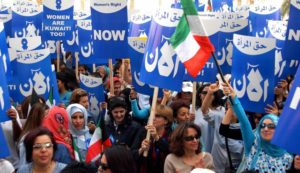
KUWAIT CITY, KUWAIT: Kuwaiti women demonstrate in front of the parliament building in Kuwait City to demand their political rights, 07 March 2005. As a battle has raged in the Gulf emirate over political rights for its disenfranchised women, female activists and their liberal supporters staged the rally the morning the parliament was scheduled to discuss a government request to speed up the debate on a women’s rights bill. The bill, approved by the cabinet last May and opposed by Islamic hardliners, calls for amending article one of the 1962 electoral law which limits voting and candidacy to male citizens whereas the constitution stipulates gender equality. AFP PHOTO/YASSER AL-ZAYYAT (Photo credit should read YASSER AL-ZAYYAT/AFP/Getty Images)
This week in nonviolent history commemorates the successful conclusion of Kuwait’s Blue Revolution. On May 17th, 2005, Kuwaiti women gained suffrage after more than 40 years of struggle. The women used a wide variety of approaches to achieve their goals, including lobbying, introducing repeated legislation, protests and demonstration, marches, rallies, and mock elections.
Like many women’s suffrage movements around the world, the Kuwaiti women escalated their actions and campaigns, shifting from legislative and legal efforts into nonviolent direct action. The history of their multi-decade effort is complex, spanning from the 1960s when Kuwait won independence from the United Kingdom, through the Iraqi occupation in 1990-1991,and onward another 15 years until a series of nonviolent actions, changing political climate, and increased pressure finally won the vote for the women of Kuwait.
The movement first began to apply bolder methods of nonviolent action in 1996 when 500 women stopped working for an hour to demand suffrage. Then, as the Global Nonviolent Action Database reports, “In 2002, several women held a demonstration near two voter registration centers in Kuwait. The demonstrators waved banners outside the two centers, but were eventually asked to leave. Kuwaiti women continued to be very assertive in 2003. There were reports of demonstrations involving more than 1,000 women in a country with a total population of two million. The campaign also unsuccessfully sued both the Minister of the Interior and the Speaker of Parliament. During the elections of 2003, women established mock ballots that allowed hundreds of women to cast symbolic votes for real candidates.”
In March of 2005, after highly visible and captivating actions, 1,000 demonstrators gathered outside of the Kuwaiti parliament to continue their demand for basic voting rights. Many women wore pale blue to represent the struggle for suffrage, leading to the moniker, “The Blue Revolution.” On May 17th, Kuwaiti parliament passed the long-awaited suffrage bill, granting women the right to vote and run for elected office.
The Blue Revolution is part of the Color Revolutions, a series of nonviolent movements that erupted from the 1970s to present day, with a peak in the late 90s and early 2000s. These movements include, the Carnation Revolution in Portugal, the People Power Revolution (also known as the Yellow Revolution) in the Philippines, the Velvet Revolution in Czechoslovakia, the Rose Revolution in Georgia, the Orange Revolution in the Ukraine, the Cedar Revolution in Lebanon, the Denim Revolution in Belarus, the Green Revolution in Iran, among many others. The use of identifiable colors and symbols was often used as an intentional tactic of solidarity and visible protest.
____________________________
A uthor/Activist Rivera Sun, syndicated by PeaceVoice, is the author of The Dandelion Insurrection, Billionaire Buddha and Steam Drills, Treadmills, and Shooting Stars, the cohost of Love (and Revolution) Radio, and the cofounder of the Love-In-Action Network. She is a trainer and social media coordinator for Campaign Nonviolence and Pace e Bene. Sun attended the James Lawson Institute on Strategic Nonviolent Resistance in 2014 and her essays on social justice movements appear in Truthout and Popular Resistance. www.riverasun.com
uthor/Activist Rivera Sun, syndicated by PeaceVoice, is the author of The Dandelion Insurrection, Billionaire Buddha and Steam Drills, Treadmills, and Shooting Stars, the cohost of Love (and Revolution) Radio, and the cofounder of the Love-In-Action Network. She is a trainer and social media coordinator for Campaign Nonviolence and Pace e Bene. Sun attended the James Lawson Institute on Strategic Nonviolent Resistance in 2014 and her essays on social justice movements appear in Truthout and Popular Resistance. www.riverasun.com
